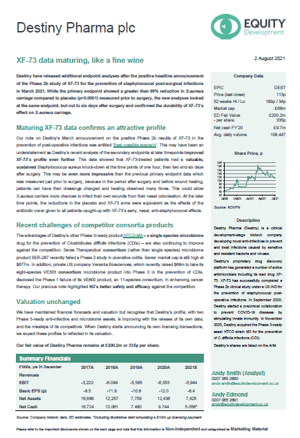Destiny have released additional endpoint analyses after the positive headline announcement of the Phase 2b study of XF-73 for the prevention of staphylococcal post-surgical infections in March 2021. The new analyses looked at the same endpoint, but out to six days after surgery and confirmed the durability of XF-73’s effect on S.aureus carriage.
The recent analysis of the secondary endpoints at later timepoints improved XF-73’s profile even further. This data showed that XF-73-treated patients had a valuable, sustained S.aureus knock-down at the time points of one hour, then two and six days after surgery. This may be even more impressive than the previous primary endpoint data which was measured just prior to surgery, because of post-operative wound dressing and observation that could allow S.aureus carriers more chances to infect wounds from their nasal colonisation.
The advantages of Destiny’s other Phase 3-ready product NTCD-M3 – a single species microbiome drug for the prevention of Clostridiodes difficile infections (CDIs) – are also continuing to improve against the competitors misfortunes. Our previous note on M3 had in fact highlighted its better safety and efficacy against the competition.
We have maintained financial forecasts and valuation at 335p / share but recognise that Destiny’s profile, with two Phase 3-ready anti-infective and microbiome assets, is improving with the release of its own data, and the missteps of its competitors.
Download the full research note below the audio summary:
26810392321 - destiny-pharma
Return to Destiny Pharma



